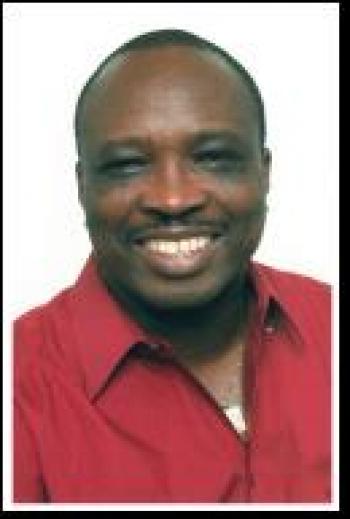GOOD NEWS FROM THE GAMBIA

|
IT IS ALL GOOD NEWS from The Gambia. The Catholic Church has brought great joy to the people. Last time we heard from the Gambia, it was with regards to the sit-tight tyrant, Yahya Jammeh who brought that beautiful country perilously close to the brinks of civil war. Jammeh was 29 years old in 1994 when he seized power from David Dawda Jawara the only ruler of The Gambia since independence. In any event, Lt. Jammeh soon transformed into a politician winning elections by all means and in a landslide fashion, until the people got bored and voted him out in 2016. Jammeh immediately conceded defeat, then changed his mind and hanged on to power until ECOWAS Forces entered the Gambia by land and also mounted a sea blockade. The tyrant scurried out of town to be replaced in office with the actual winner, Adama Barrow. This month, it is good news and unlimited joy for our brothers and sisters of The Gambia. The entire nation has been in celebration with the ordination, installation, and Mass of Thanksgiving of Most Rev. Gabriel Mendy, the first indigenous Bishop of the Catholic Diocese of Banjul. On February 3, 2018 they gathered at the Independence Stadium Bakau, the same venue of Pope John Paul’s 1992 Eucharistic Celebration. Clad in various costumes, with two specially made fabrics dominating the scene; they were Catholics and non-Catholics; Anglicans and Methodists. Pope John Paul’s remark at that same venue 26 years earlier rang true once more: Beg nanyu ngir ne sonyu harit u seringe u bare hgi fi tew. (We are happy that so many Muslim friends are present). The Gambia is overwhelmingly a Muslim country; it is also a Catholic country. How come? More than 90% of the population is Muslim, of the remaining; Catholics form the largest bloc and the most influential. With mission schools catering for all without discrimination, many Gambians, regardless of religious persuasion, receive Catholic education. The 30,000 plus Catholic population in The Gambia is organized under the Diocese of Banjul which has ecclesiastical jurisdiction over the entire country. The area previously known as The Prefecture Apostolic of Bathurst in Gambia was elevated to Diocese of Bathurst on 24 June 1957 and had its name changed to Diocese of Banjul on 9 May 1974. Even with these developments the Church in the Gambia still remained much of a missionary church as long as the headship was not indigenous. The much smaller Anglican Church had appointed three African Bishops to date. Also the attitude of government to religion in general and to the Catholic Church in particular probably called for some action. Of Gambia’s three rulers, the current incumbent, Adama Barrow appears to be the least attracted to activities of the Church. Sir Dauda Jawara was a Methodist before he became a Muslim who enthusiastically supported the Catholic faith and it was under his rule that Pope John Paul II paid the first papal visit to the Gambia in 1992. Yahya Jammeh, who towards the end of his dictatorship declared the country as Islamic Republic of The Gambia reportedly showed some warmth towards the Church.Barrow has not been perceived as being so warmly inclined. Some segments even criticized his delay in congratulating the new Bishop. In any event, President Barrow was represented at the ordination by a delegation of ministers expressing the hope of stronger relations “amongst Gambians of all denominations and religions”. Maybe it is just Barrow being himself, maybe the experience with Jammeh declaring the country an Islamic Republic is fueling Christian mistrust of another Muslim in power. It must be stated that The Gambia enjoys considerable harmony amongst the different religious groups. The ordination of Bishop Gabriel Mendy had an international flavor to it. Archbishop Edward Tamba Charles of Freetown, Sierra Leone was Principal Consecrator while Bishop Mendy’s predecessor, Bishop Robert Patrick Ellison, Emeritus of Banjul, Gambia and Bishop John Bonaventure Kwofie of Sekondi-Takoradi, Ghana, both Spiritians were Co-consecrators. Nigeria is not unconnected with the occasion. At the time of his appointment to the episcopal seat of Banjul, Bishop Gabriel Mend was Vice-Rector at the Spiritan International School of Theology Enugu, Nigeria where he had been a professor for seven years. His tie to Nigeria was even longer having studied philosophy at Nsukka between 1987 and 1990, and Theology at the Spiritan International School of Theology, Enugu from 1993 to 1997. He is very much a son of the Nigerian soil; not only him, but many Church leaders in The Gambia. Gambia’s first indigenous Catholic priest, Fr. Edward Gomez (ordained April 12, 1986) studied at Catholic Institute of West Africa, CIWA,Port Harcourt. Priests of the Missionary Society of St. Paul MSP from Nigeria serve in the Diocese of Banjul. The Anglican Church of the Gambia also shares a lot with Nigeria. Most Rev. Solomon Tilewa Johnson, first indigenous Bishop of the Anglican Church of the Gambia was a student at Trinity College, Umuahia, while his successor Bishop James Allen Yaw Odico studied Christian Education and Youth Ministry at Immanuel College of Theology in Ibadan. What is more, a Nigerian, Most Rev. Timothy Olufosoye before becoming the Anglican Bishop of Ibadan and first Archbishop and Primate of the Anglican Church of Nigeria was the first African Bishop of the Anglican Church of The Gambia. The day following his episcopal ordination, Bishop Mendy was installed in the Cathedral of Our Lady of the Assumption in Banjul. The following Sunday, February 11, 2018 the new Bishop celebrated a Mass of Thanksgiving in his hometown Parish Church of St. Peter’s, Lamin. Celebrations over, Bishop Mendy and the faithful of his Diocese have joined the worldwide Church in entering the season of Lent. May their sacrifices join with our prayers for the Good of the Church. |
© 2024 - Catholic Archdiocese of Ibadan





